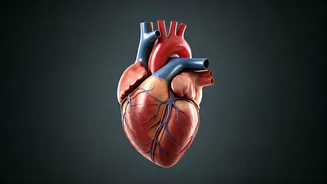Heart Failure Explained
Heart failure is a prevalent condition, often misunderstood by many. A cardiologist highlights the increasing frequency of this ailment and provides insights
into recognizing its signs and symptoms early. Heart failure occurs when the heart cannot pump enough blood to meet the body's needs. This condition can stem from various underlying issues that impede the heart's ability to function effectively. The significance of early detection cannot be overstated in managing heart failure, as timely intervention can significantly improve outcomes and enhance the quality of life. The article stresses the need to be aware of the signals the body sends, as these can serve as crucial indicators requiring medical attention.
Heart Attack vs Arrest
Distinguishing between a heart attack and cardiac arrest is essential for immediate action. A heart attack occurs when blood flow to the heart is blocked, potentially causing damage. Cardiac arrest, however, is the abrupt loss of heart function, breathing, and consciousness, often resulting from an electrical malfunction in the heart. While both are serious and can be life-threatening, they require different immediate responses. Recognizing the differences and knowing how to respond appropriately can be life-saving. Quick intervention, such as CPR in cases of cardiac arrest, significantly improves the chances of survival and recovery.
Warning Signs to Watch
Identifying the warning signs of heart problems is paramount. One should not ignore chest pain, which can be a primary symptom of a heart attack. Shortness of breath, especially when coupled with other symptoms, is another critical indicator. Other symptoms may include pain radiating to the arm, jaw, or back, fatigue, and sudden dizziness. Experiencing any of these symptoms warrants immediate medical attention. It is crucial to be proactive and consult a healthcare professional at the onset of any of these indicators. Prompt diagnosis and treatment are vital to prevent severe health consequences and to improve outcomes.
Prevention Strategies: Tips
Preventative measures are essential for maintaining heart health and reducing risks. A healthy lifestyle plays a pivotal role. This includes a balanced diet rich in fruits, vegetables, and lean proteins, and limiting saturated and trans fats. Regular physical activity, such as brisk walking, jogging, or swimming for at least 30 minutes most days of the week, can significantly improve heart health. Additionally, managing stress through techniques like yoga or meditation is beneficial. Avoiding smoking and excessive alcohol consumption are also crucial. Regular check-ups with your doctor are crucial for monitoring heart health and addressing potential issues early.
Diet and Lifestyle Changes
Dietary choices significantly impact heart health. A heart-healthy diet emphasizes whole grains, fruits, vegetables, and lean proteins while limiting processed foods, sugary drinks, and excessive salt intake. Incorporating foods rich in omega-3 fatty acids, such as fish and flaxseeds, is beneficial. Lifestyle modifications are as essential as dietary adjustments. Maintaining a healthy weight, quitting smoking, and managing stress are key factors. Practicing relaxation techniques, getting adequate sleep, and staying active contribute to overall cardiovascular well-being. Consistently adhering to these changes significantly reduces the risk of heart disease and promotes longevity.
Role of Regular Checkups
Regular medical check-ups are fundamental for proactive heart health management. These visits allow doctors to monitor blood pressure, cholesterol levels, and other vital signs. Early detection of risk factors like high blood pressure or high cholesterol allows for timely intervention. Preventative screening tests can identify potential heart problems before symptoms appear. Regular check-ups also provide an opportunity to discuss any concerns and receive personalized advice tailored to one's health profile. Making these checkups a routine part of your healthcare regimen is a critical step in preserving heart health and overall well-being.















